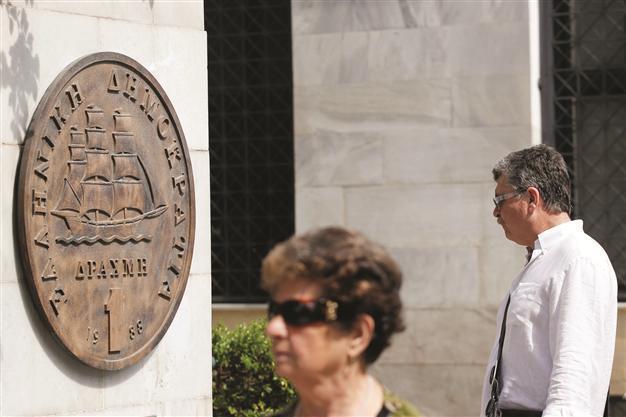Debates heats up on Greece’s exit eurozone
ISTANBUL- Hürriyet Daily News

A pedestrian passes a plaque portraying a Greek one-drachma coin, which was replaced by the euro in 2002, outside Athens City Hall. AP photo
European officials are working on contingency plans in case Greece bombs out of the eurozone, the European Union’s trade commissioner said May 18, while Berlin said it was prepared for all eventualities. This added to rumors about physical preparations for Greece’s return to drachma.
Policymakers insist they want Greece to remain in the eurozone but EU Trade Commissioner Karel De Gucht said the European Commission and the European Central Bank were working on scenarios in case it is forced to leave.
“A year and a half ago there maybe was a risk of a domino effect,” De Gucht told Belgium’s Dutch-language newspaper De Standaard, in comments confirmed by a person close to him.
“But today there are in the European Central Bank, as well as in the [European] Commission, services working on emergency scenarios if Greece shouldn’t make it. A Greek exit does not mean the end of the euro, as some claim.”
However, a spokesman for the European Commission, the executive of the EU, said there was no active planning.
As world leaders gathered at Camp David May 18 with a Greece agenda, which obviously did not exclude a decision that ends support for Greece’s existence in the eurozone, a coalition partner of Chancellor Angela Merkel said the 17-nation group could absorb a Greek exit.
Merkel calls PapouliasMerkel called for a stable Greek government to be formed quickly after new elections in a telephone call with President Karolos Papoulias May 18, a German government spokesman said.
“The chancellor had a telephone conversation on May 18 morning with Papoulias,” deputy government spokesman Georg Streiter said at a news conference.
Asked whether Germany was preparing for a Greek exit from the euro, a spokeswoman cited Finance Minister Wolfgang Schaeuble’s earlier comment that “our citizens expect us to be prepared for every eventuality.”
The British government is making urgent preparations to cope with the fallout of a possible Greek exit from the single currency, after the governor of the Bank of England, Sir Mervyn King, warned that Europe was “tearing itself apart,” Guardian newspaper said on May 17.
“The crisis in Greece is a very serious and immediate problem,” said Uri Dadush, a former senior World Bank official. “Bank deposits are leaving Greece today.”
The medicine Greece has been taking is not working, he said. “This will be an opportunity for the United States, Italy and France, not to gang up, but to work together on Merkel to say, ‘Look, you need a somewhat different approach.’”
‘Bloc can absorb’A Greek exit from the eurozone would be extremely costly, but the bloc could absorb this move, a top member of Merkel’s junior coalition partner said May 18. “Unlike two years ago, the eurozone today could cope with a Greek exit,” former Economic Minister Rainer Brüderle said in an interview with German business daily Handelsblatt. “It would cost a lot of money but it would be manageable. The decision, however, lies in Athens and not in Berlin.”
“The Greeks themselves have to weigh up whether reintroducing the drachma would help their economic recovery more than staying in the eurozone,” said Brüderle, who is now parliamentary chief for the Free Democrats Party.
De La Rue has drawn up contingency plans to print drachma banknotes should Greece exit the euro and approach the British money printer, an industry source told Reuters on May 18.
The source, who asked not to be named, said that as a commercial printer De La Rue needed to be alive to the possibility of a Greek exit from the single currency and prepare accordingly.
An exit from Europe’s single currency would spark a major demand for the returning drachma and while the country’s state printers could orchestrate its production, a handful of global firms like De La Rue could be called on to help.
Large rating cut by FitchFitch ratings agency downgraded Greece to the lowest possible grade for a country not in default on May 17, noting that if the next elections do not produce a government that supports the bailout, Greece’s exit from the eurozone “would be probable.”
Ratings agency Moody’s downgraded 16 Spanish banks late on May 17, three days after downgrading Italy’s, noting they are vulnerable to huge losses on government debt.
